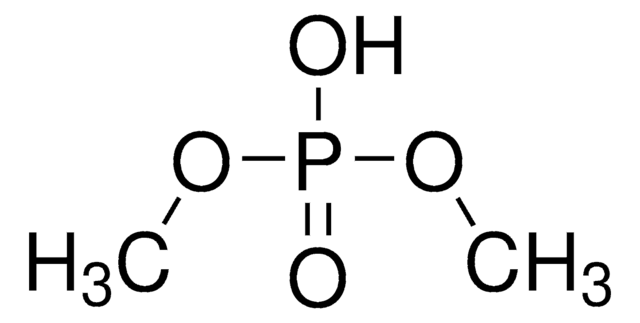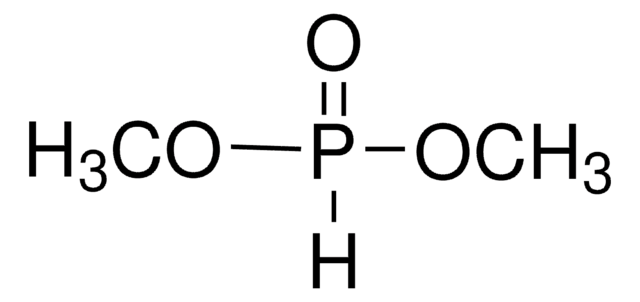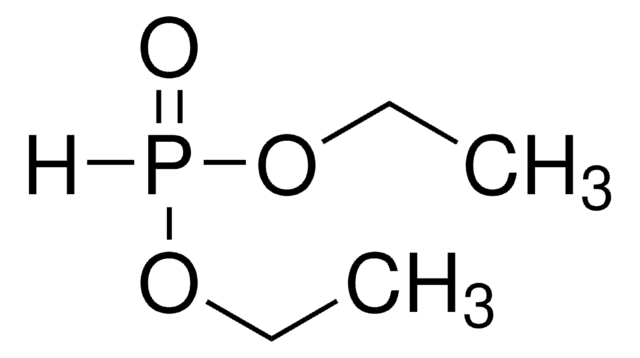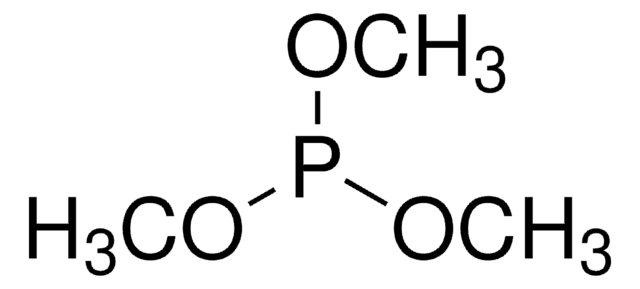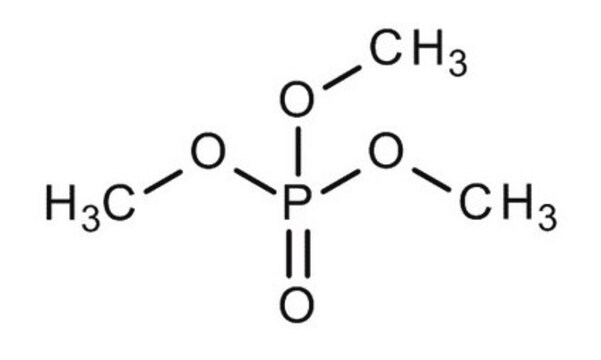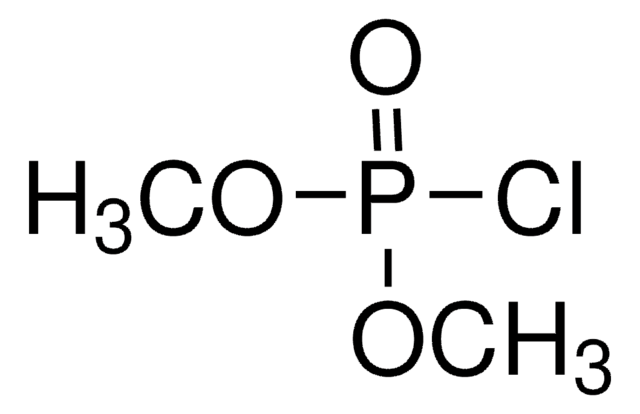All Photos(1)
About This Item
Empirical Formula (Hill Notation):
C2H7O4P
Molecular Weight:
126.05
EC Number:
MDL number:
UNSPSC Code:
12352200
PubChem Substance ID:
Recommended Products
form
liquid
SMILES string
O=P(OC)(OC)O
InChI
1S/C2H7O4P/c1-5-7(3,4)6-2/h1-2H3,(H,3,4)
InChI key
KKUKTXOBAWVSHC-UHFFFAOYSA-N
Other Notes
Please note that Sigma-Aldrich provides this product to early discovery researchers as part of a collection of unique chemicals. Sigma-Aldrich does not collect analytical data for this product. Buyer assumes responsibility to confirm product identity and/or purity. All sales are final.
NOTWITHSTANDING ANY CONTRARY PROVISION CONTAINED IN SIGMA-ALDRICH′S STANDARD TERMS AND CONDITIONS OF SALE OR AN AGREEMENT BETWEEN SIGMA-ALDRICH AND BUYER, SIGMA-ALDRICH SELLS THIS PRODUCT "AS-IS" AND MAKES NO REPRESENTATION OR WARRANTY WHATSOEVER WITH RESPECT TO THIS PRODUCT, INCLUDING ANY (A) WARRANTY OF MERCHANTABILITY; (B) WARRANTY OF FITNESS FOR A PARTICULAR PURPOSE; OR (C) WARRANTY AGAINST INFRINGEMENT OF INTELLECTUAL PROPERTY RIGHTS OF A THIRD PARTY; WHETHER ARISING BY LAW, COURSE OF DEALING, COURSE OF PERFORMANCE, USAGE OF TRADE OR OTHERWISE.
NOTWITHSTANDING ANY CONTRARY PROVISION CONTAINED IN SIGMA-ALDRICH′S STANDARD TERMS AND CONDITIONS OF SALE OR AN AGREEMENT BETWEEN SIGMA-ALDRICH AND BUYER, SIGMA-ALDRICH SELLS THIS PRODUCT "AS-IS" AND MAKES NO REPRESENTATION OR WARRANTY WHATSOEVER WITH RESPECT TO THIS PRODUCT, INCLUDING ANY (A) WARRANTY OF MERCHANTABILITY; (B) WARRANTY OF FITNESS FOR A PARTICULAR PURPOSE; OR (C) WARRANTY AGAINST INFRINGEMENT OF INTELLECTUAL PROPERTY RIGHTS OF A THIRD PARTY; WHETHER ARISING BY LAW, COURSE OF DEALING, COURSE OF PERFORMANCE, USAGE OF TRADE OR OTHERWISE.
Signal Word
Danger
Hazard Statements
Precautionary Statements
Hazard Classifications
Acute Tox. 4 Dermal - Acute Tox. 4 Oral - Aquatic Chronic 3 - Eye Dam. 1 - Skin Corr. 1B - Skin Sens. 1
Storage Class Code
8A - Combustible corrosive hazardous materials
WGK
WGK 3
Flash Point(F)
Not applicable
Flash Point(C)
Not applicable
Choose from one of the most recent versions:
Certificates of Analysis (COA)
Lot/Batch Number
Sorry, we don't have COAs for this product available online at this time.
If you need assistance, please contact Customer Support.
Already Own This Product?
Find documentation for the products that you have recently purchased in the Document Library.
Customers Also Viewed
Taku Matsushita et al.
Water research, 138, 67-76 (2018-03-25)
Removal efficiencies of 28 pesticide transformation products (TPs) and 15 parent pesticides during steps in drinking water treatment (coagulation-sedimentation, activated carbon adsorption, and ozonation) were estimated via laboratory-scale batch experiments, and the mechanisms underlying the removal at each step were
Yan Zhang et al.
American journal of epidemiology, 189(5), 375-383 (2019-12-18)
Organophosphates (OPs) are the most heavily used pesticides in China. The Chinese population, including preconceptional women, is highly exposed, yet little is known regarding the associations between OP exposure and menstruation in humans. We conducted a cross-sectional analysis in women
Abigail Gaylord et al.
Molecular and cellular endocrinology, 502, 110666-110666 (2020-01-19)
Endocrine disrupting chemicals are known to cause neurodevelopmental toxicity through direct and indirect pathways. In this study we used data from the National Health and Nutrition Examination Surveys, along with known exposure-disease relationships, to quantify the intellectual disability burden attributable
Ian E Cock et al.
Pharmacognosy research, 3(2), 85-94 (2011-07-21)
Scaevola spinescens is an endemic Australian native plant with a history of use as a medicinal agent by indigenous Australians. Yet the medicinal bioactivities of this plant are poorly studied. S. spinescens solvent extracts were tested for antimicrobial activity, antiviral
Xiuzhong Wang et al.
Langmuir : the ACS journal of surfaces and colloids, 34(26), 7899-7905 (2018-06-12)
Phosphate-containing molecules exist in many forms in biology and the environment, and their interaction with metal oxides is an important aspect of their chemistry and biochemistry. In this work, phosphates with different degrees of polymerization (e.g., orthophosphate, pyrophosphate (PPi), sodium
Our team of scientists has experience in all areas of research including Life Science, Material Science, Chemical Synthesis, Chromatography, Analytical and many others.
Contact Technical Service